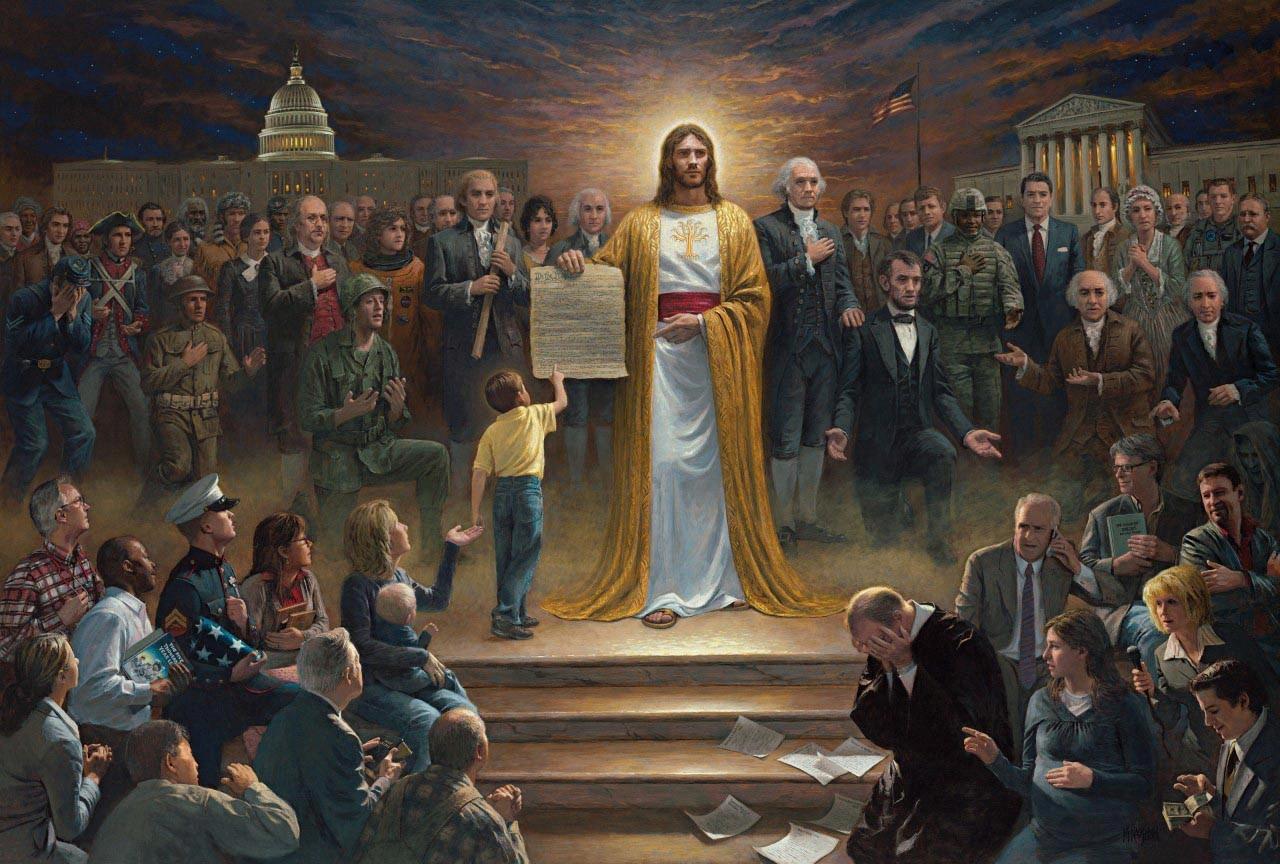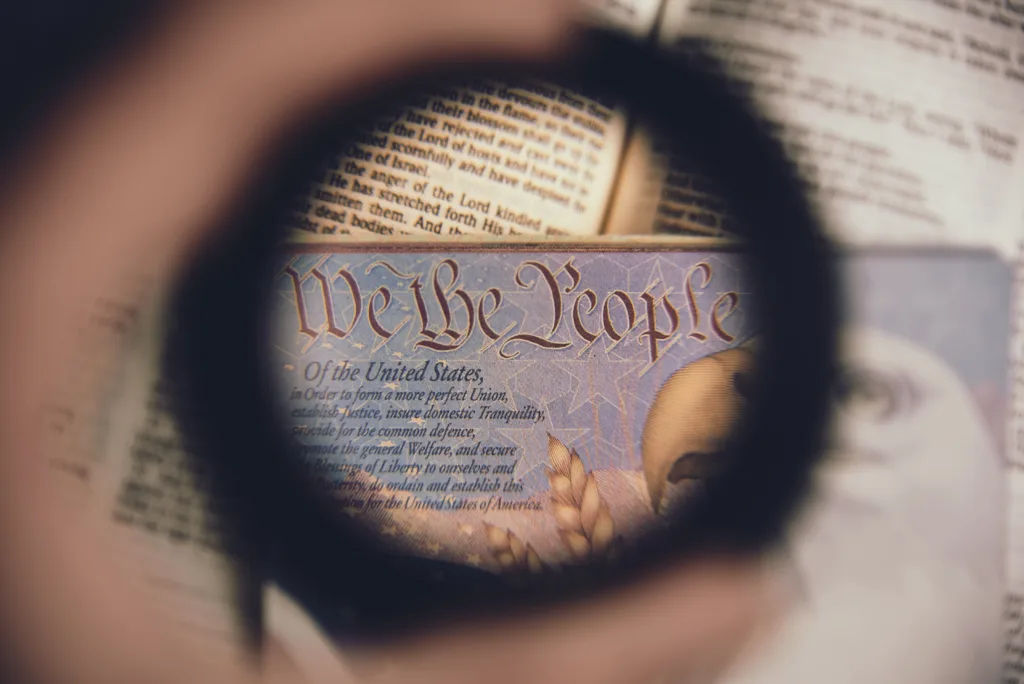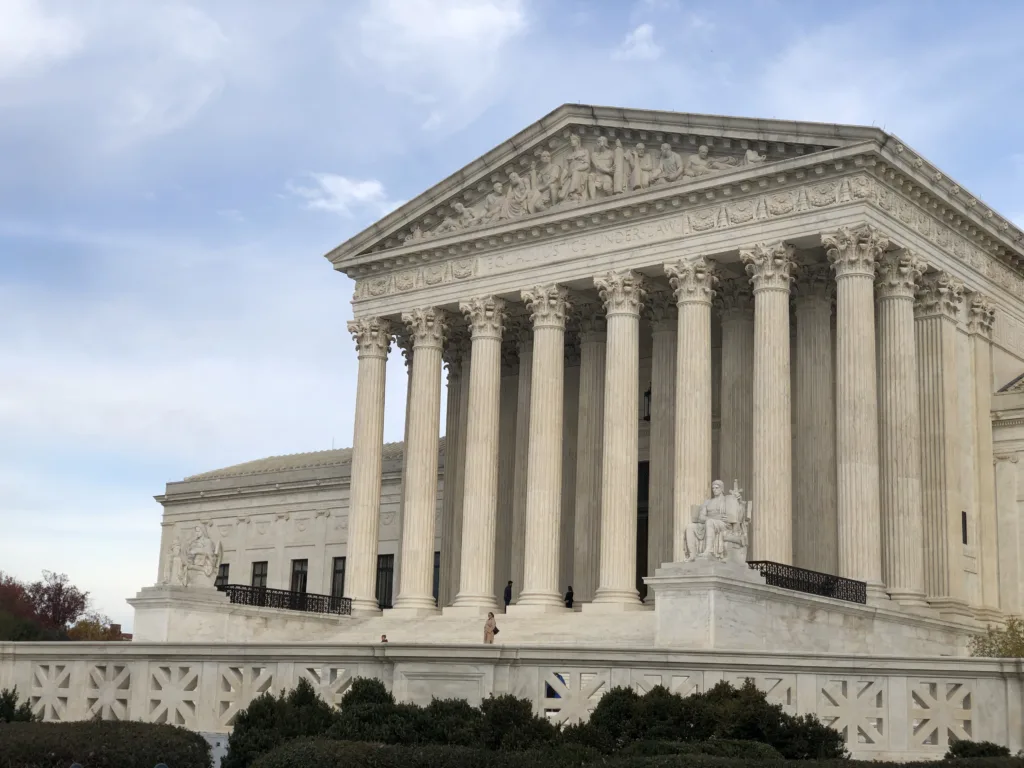The question of whether or not God is mentioned in the United States Constitution remains a topic of debate among scholars and citizens alike. While the word “God” does not appear in the text of the Constitution, the Founders of our country were undoubtedly influenced by Christian ideas and beliefs.
Many of the Founders were practicing Christians, and their faith played a significant role in the formation of the American republic. For example, their belief in the inherent sinfulness of humans is reflected in James Madison’s writing in Federalist No. 51, where he argues that the separation of powers in the government is necessary to check the corrupting influence of power.
Despite the influence of Christian beliefs on the Founders, the Constitution itelf is a secular document. The First Amendment explicitly prohibits the government from establishing a state religion or interfering with the free exercise of religion. This separation of church and state is a hallmark of American democracy, and it ensures that citizens of all faiths (or no faith) are free to practice and express their beliefs without fear of persecution or discrimination.
One area where the question of God and the Constitution arises is in the use of the phrase “In God We Trust.” This phrase first appeared on U.S. coins in 1864, and it was officially adopted as the national motto in 1956. Some argue that the use of this phrase violates the Establishment Clause of the First Amendment, which prohibits the government from endorsing a particular religion.
However, the courts have consistently upheld the constitutionality of the national motto. In a 1970 case, Aronow v. United States, the Ninth Circuit Court of Appeals ruled that the phrase “In God We Trust” does not violate the Establishment Clause because it has “lost through rote repetition any significant religious content.” In other words, the phrase has become so commonplace that it is no longer seen as a religious statement, but rather as a patriotic one.
While the word “God” does not appear in the Constitution, the Founders were certainly influenced by Christian ideas and beliefs. However, the Constitution itself is a secular document that enshrines the separation of church and state. The use of the phrase “In God We Trust” as the national motto has been upheld as constitutional, but it is important to remember that this phrase does not represent an endorsement of any particular religion by the government.
Mention of Religion in the Constitution
The Constitution of the United States mentions religion in the First Amendment. The First Amendment begins with the statement “Congress shall make no law respecting an establishment of religion.” This means that the government cannot establish a national religion or give special treatment to one religion over another. The First Amendment also protects the free exercise of religion, meaning individuals are free to practice their religion of choice without interference or persecution from the government. Additionally, the First Amendment protects freedom of speech, freedom of the press, and the right to peacefully assemble and petition the government for redress of grievances.

Source: amazon.com
The Founding Fathers and God
The founding fathers did not mention God in the Constitution. The document, drafted during the Constitutional Convention in 1787, outlines the framework for the United States government without any explicit references to a higher power or deity. However, many of the founding fathers were religious and believed in the importance of morality and ethics in government, which is reflected in the Constitution’s emphasis on individual rights, justice, and the rule of law. While the Constitution does not establish a state religion, the first amendment guarantees the freedom of religion and protects citizens’ rights to practice their beliefs.
The Relationship Between the U.S. Constitution and Christianity
The U.S. Constitution is not based on Christianity, but it is true that the Founders of the American republic were influenced by Christian ideas to some extent. While the Constitution and the Bill of Rights do not mention Christianity, many of the Founders were deeply religious and believed that certain Christian principles were important for governing a just and stable society. For example, they believed that humans were inherently sinful and needed a system of checks and balances to prevent any one person or group from gaining too much power. They also believed in the idea of natural law, which holds that there is a higher moral law that transcends human laws and that all people are equal in the eyes of God. However, it is important to note that the Constitution is a secular document that is intended to protect the rights of all Americans, regadless of their religious beliefs. In fact, the First Amendment explicitly prohibits the government from establishing any particular religion or interfering with the free exercise of religion.
Does the Constitution Mention ‘In God We Trust’?
The phrase “In God We Trust” is mentioned in the Constitution, but not as an official motto or national slogan. It was first used on U.S. coins in 1864 during the Civil War and became the official national motto in 1956 under President Dwight D. Eisenhower. However, opponents argue that the use of the phrase on official U.S. currency and in government buildings violates the Establishment Clause of the First Amendment, which prohibits the government from endorsing or promoting religion. Despite these arguments, federal courts have consistently upheld the constitutionality of the national motto.
The U.S. Constitution and God
The United States Constitution does not explicitly mention God. The only reference to religion in the Constitution is in the First Amendment, which states that “Congress shall make no law respecting an establishment of religion, or prohibiting the free exercise thereof.” This clause is commonly referred to as the Establishment Clause and the Free Exercise Clause. Additionally, the Constitution uses the phrase “the year of our Lord” in Article VII, but this is a standard way of referring to the date and does not necessarily imply a religious endorsement. Therefore, wile the Constitution protects freedom of religion, it does not endorse any particular religion or belief in God.

Source: jonmcnaughton.com
The Founding Fathers’ Views on God
The Founding Fathers of the United States did not explicitly state teir belief or disbelief in God, but they did emphasize the separation of church and state in the Constitution. The Constitution does not mention God or any religious affiliation, and it does not establish a national religion. The First Amendment states that “Congress shall make no law respecting an establishment of religion, or prohibiting the free exercise thereof.” This means that the government cannot favor one religion over another, nor can it prevent individuals from practicing their own religion.
Some of the Founding Fathers, such as Thomas Jefferson and Benjamin Franklin, were known for their skepticism towards organized religion and their belief in the power of reason and science. However, others, such as George Washington and John Adams, were more traditional in their religious beliefs.
The Founding Fathers sought to create a government that protected individual freedoms and rights, including the freedom of religion. They recognized the importance of religion in the lives of many Americans, but also understood the potential dangers of mixing religion and government. As a result, the Constitution remains a secular document that does not promote or endorse any specific religion.
The Absence of God in the Constitution
God was left out of the Constitution for several reasons. One of the main reasons was the desire to establish a clear separation between church and state. Many of the founding fathers, such as James Madison, believed that the government should not endorse or favor any particular religion. They feared that if the Constitution included references to God, it wuld give the impression that the government was endorsing a particular religion or religious belief.
Additionally, the founders recognized that the American people came from a variety of different religious backgrounds and beliefs. They did not want to alienate any particular group by including language that might be seen as exclusive or favoring one religious group over another.
Furthermore, the Constitution was designed to be a legal document that established the framework for how the government would operate. Including references to God or religion would have been seen as irrelevant to the legal and political structure of the document.
The founders’ decision to leave God out of the Constitution was based on their desire to establish a government that was neutral on matters of religion and to ensure that the Constitution reflected the diversity of religious beliefs among the American people.
The Founding Fathers’ Views on Jesus
The Founding Fathers had varying opinions aout Jesus, but overall, they respected the moral teachings of Christianity. Benjamin Franklin, for example, believed that the system of morals and religion taught by Jesus had been corrupted over time. He and many other dissenters in England believed that Christianity needed to be reformed. Thomas Jefferson, on the other hand, was highly critical of the supernatural elements of Christianity and considered Jesus to be a great moral teacher, but not divine. He even created his own version of the Bible, which excluded references to miracles and the divinity of Jesus. However, many other Founding Fathers, such as John Adams and George Washington, were devout Christians who believed in the divinity of Jesus and the importance of Christian values in society. while the Founding Fathers had differing opinions about Jesus, they recognized the importance of morality and ethics in shaping a just society.
The Origin of the Concept of God
The concept of God has been present in human societies since ancient times, and it is difficult to attribute its origin to a single person. However, the idea of God as a self-existent being was developed and explained by St. Anselm in the eleventh century. Anselm was a theologian and philosopher who used various arguments to show that there must be a being that is supremely great and good, and that amog all beings that exist, nothing is its equal. Anselm’s work had a significant impact on the development of Christian theology and philosophy, and his concept of God as a self-existent being continues to be influential in modern discussions of the nature of God.

Religion and the Constitution: Is There a Conflict?
Religion is not above the Constitution in India. The Indian Constitution guarantees freedom of religion to all its citizens, but it also states that no person can be discriminated on the basis of their religion. The Constitution is the supreme law of the land, and all citizens are required to abide by it. Any religious practice or belief that violates the Constitution’s provisions can be challenged in the courts of law. In case of a conflict between religion and the Constitution, the Constitution takes precedence. Therefore, it is clear that in India, the Constitution is above religion.
Does the Constitution Define Religion?
The Constitution does not define religion. The First Amendment of the Constitution guarantees the freedom of religion, whch means that individuals are free to practice any religion or no religion at all. However, the Constitution does not provide a specific definition of what constitutes a religion. This has led to debates and legal challenges over the years as to what qualifies as a religious belief or practice. The Supreme Court has attempted to provide some guidance on this issue but has never articulated a formal definition of religion. Instead, the Court has developed a set of criteria to differentiate religious beliefs and actions from similar nonreligious beliefs, such as secular moral or ethical beliefs. These criteria include whether the belief is sincerely held, whether it is part of a comprehensive belief system, whether it involves a relationship with a higher power or divine being, and whether it involves moral or ethical obligations.
The Relationship Between Church and State According to the Constitution
The Constitution of the United States contains two clauses that specifically address the issue of church and state. The First Amendment’s Establishment Clause states that “Congress sall make no law respecting an establishment of religion.” This means that the government cannot establish an official state religion, nor can it favor one religion over another. The Free Exercise Clause of the First Amendment also guarantees that individuals have the right to practice their religion without interference from the government.
These clauses have been interpreted by the Supreme Court to mean that the government must remain neutral when it comes to religion, and cannot take actions that promote or inhibit any particular religion. This includes prohibiting government-sponsored prayer in public schools, as well as preventing the government from providing financial support to religious institutions.
However, it is important to note that the separation of church and state does not mean that religion has no role in public life. Individuals are still free to practice their religion and express their beliefs, and religious organizations can still engage in a variety of activities, including charitable work and political advocacy. The Constitution simply ensures that the government remains neutral and does not use its power to promote or restrict any particular religion.
The Constitutionality of Under God in the Pledge of Allegiance
The question of whether “under God” in the Pledge of Allegiance is constitutional has been a subject of debate and legal challenge for several decades. The inclusion of the phrase “under God” was added to the Pledge in 1954, and since then, there have been several legal challenges to its constitutionality.
The argument against the constitutionality of “under God” in the Pledge is based on the principle of the separation of church and state, which is enshrined in the First Amendment of the United States Constitution. The Establishment Clause of the First Amendment prohibits the government from establishing or endorsing a religion, and the inclusion of the phrase “under God” in the Pledge has been seen by some as a violation of this principle.
In 2002, a case called Newdow v. United States was brought before the United States Court of Appeals for the Ninth Circuit, which ruled that the inclusion of “under God” in the Pledge was unconstitutional. The court argued that the phrase violated the Establishment Clause by promoting monotheism as a national objective.
However, in 2004, the Supreme Court overruled the Ninth Circuit’s decision, stating that the plaintiff, who was an atheist, did not have standing to bring the case. The Court did not rule on the constitutionality of “under God” in the Pledge itself.
The question of whether “under God” in the Pledge is constitutional remains a matter of debate and legal interpretation. While some argue that it violates the principle of the separation of church and state, others maintain that it is a longstanding tradition that does not endorse any particular religion. Ultimately, the constitutionality of “under God” in the Pledge is likely to continue to be a subject of legal and societal debate for the foreseeable future.

The Addition of Under God to the Pledge of Allegiance
Under God was added to the Pledge of Allegiance in 1954 during the Cold War era. At that time, the Soviet Union was promoting atheism as the official state policy, and many members of Congress wanted to emphasize the differences btween the United States and the officially atheistic Soviet Union. Adding “Under God” to the Pledge was seen as a way to highlight the religious values and beliefs of the United States, and to distinguish the country from the Soviet Union. The phrase was also seen as a way to promote national unity and patriotism, as well as to reinforce the idea that the United States was founded on Judeo-Christian principles.
Is God Mentioned in the Texas Constitution?
God is mentioned in the Texas Constitution. The preamble of the Texas Constitution begins with the phrase “Humbly invoking the blessings of Almighty God, the people of the State of Texas do ordain and establish this Constitution.” Additionally, Article 1, Section 6 of the Texas Constitution states that “All men have a natural and indefeasible right to worship Almighty God accoding to the dictates of their own consciences.” This section affirms the right of individuals to freely practice their religion without interference from the government. the Texas Constitution acknowledges the importance of God and religion as fundamental aspects of society and individual liberty.
Conclusion
While the Constitution and Bill of Rights do not mention God, it is clear that the Founders of the United States were influenced by Christian ideas and beliefs. Their understanding of the sinful nature of humans and the importance of individual freedoms and rights are rooted in Christian teachings. However, the separation of church and state is an important principle in American democracy, and the First Amendment ensures that the government cannot establish a religion or prohibit the free exercise of one’s chosen faith. Whether or not one believes in God, it is important to understand the role that religion has played in shaping our country’s history and values.
